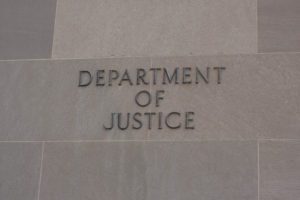By the Constantine Cannon Whistleblower Team
Last summer, the Department of Justice (DOJ) launched its Corporate Whistleblower Awards Pilot Program to focus on criminal activity that generally falls outside the major established whistleblower rewards programs such as the False Claims Act and the SEC, CFTC, FinCEN, and IRS whistleblower programs. Other than some additional guidance on the Program former DOJ Criminal Chief Nicole Argentieri provided last September, there has been virtually no mention of the Program since. Until now.
DOJ EXPANDS WHISTLEBLOWER PILOT PROGRAM
In a speech he gave last week (May 12) at SIFMA’s Anti-Money Laundering and Financial Crimes Conference,[1] new DOJ Criminal Chief Matthew Galeotti announced the Criminal Division’s new enforcement priorities and a revised Whistleblower Pilot Program to help DOJ with its plan. Galeotti’s message to would-be whistleblowers in corporate compliance, anti-money laundering, and financial crime departments was clear:
“We want to hear from you and we want your companies to hear from you. Now is the time to report, remediate, and strengthen compliance to ensure American prosperity.”
So if there were any question on whether the Trump Administration was going to rely on whistleblowers and the Pilot Program to go after corporate crime, Galeotti has answered with a resounding yes. And he backed up his words with both a memo to all DOJ Criminal Division Staff and a formal Revised Pilot Program, which further elaborate on the specific kind of assistance the new Administration is looking for whistleblowers to provide.[2]
SEVERAL NEW AREAS OF DOJ FOCUS
The original Pilot Program (launched in August 2024) largely mirrored the SEC Whistleblower Rewards Program and focused on four primary areas of corporate crime: foreign and domestic corruption, financial institution fraud, and healthcare fraud. The newly revised Pilot Program essentially leaves the existing framework intact, but significantly expands upon the subject areas the Program will cover.
In addition to the original four key areas of DOJ focus, the expanded Program will also target: (i) government contracting fraud, (ii) tariff and customs fraud, (iii) immigration law violations, and (iv) illicit activity by international cartels relating to sanctions offenses, money laundering, drug trafficking, and terrorism. According to Galeotti, “We have made [these] changes . . . to reflect our focus on the worst actors and most egregious crimes.”
In his DOJ Criminal Division staff memo, Galeotti elaborated further on where he wants to direct the Division’s resources and the areas where he wants to hear from whistleblowers under the Pilot Program:
Healthcare/Procurement Fraud. “Rampant health care fraud and program and procurement fraud drain our country’s limited resources. Corporations and individuals defraud important government initiatives, including Medicare, Medicaid, defense spending, and other programs intended to assist vulnerable citizens. . . . The Criminal Division will lead the fight in holding accountable those who exploit these programs and harm the public fisc for personal gain.”
Complex Financial Frauds. “Complex frauds also victimize U.S. investors and weaken the integrity of markets. Schemes that defraud Americans—such as Ponzi schemes, investment fraud, elder fraud, and others—take advantage of investors and consumers, especially the most vulnerable. The victims of such fraudulent conduct are often left devastated, burdened by emotional pain and deprived of their hard-earned savings.”
Tariff/Customs Fraud. “The Criminal Division must also focus resources on threats to the U.S. economy, American competitiveness, and our national security. Trade and customs fraudsters, including those who commit tariff evasion, seek to circumvent the rules and regulations that protect American consumers and undermine the Administration’s efforts to create jobs and increase investment in the United States. Prosecuting such frauds will ensure that American businesses are competing on a level playing field in global trade and commerce.”
Sanctions Violations. “The exploitation of our financial system is detrimental to American interests in and of itself and can also enable underlying criminal conduct. Financial institutions, shadow bankers, and other intermediaries aid U.S. adversaries by processing transactions that evade sanctions. Corrupt companies and foreign officials help these sanctioned entities avoid appropriate restrictions and commit pernicious crimes, promoting the cycle of drugs and violence that has harmed so many Americans.”
Money Laundering. “White-collar criminals also corrupt our financial system—the safest and most secure in the world—by laundering criminal funds. Sophisticated money laundering operations, including Chinese Money Laundering Organizations, aid criminal actors by moving their tainted money across borders to conceal it from law enforcement and facilitate more crime. These crimes undermine national security by exploiting our financial system and strengthening foreign criminal organizations. They also facilitate the flow of dangerous drugs and fentanyl precursors to our shores.”
Terrorist Financing. “Foreign terrorist organizations target U.S. nationals living at home and abroad for terror attacks. They often cannot carry out their operations without assistance from foreign companies and financial networks. Businesses and financial institutions that provide material support to foreign terrorist organizations place the lives and safety of U.S. citizens at risk.”
CONSTANTINE CANNON REPRESENTS PILOT PROGRAM WHISTLEBLOWERS
Constantine Cannon whistleblower partner Gordon Schnell is heartened by DOJ’s renewed interest in the Pilot Program. Schnell says it has been almost a year since the Program’s inception and after the fanfare surrounding the initial launch, there has been virtually no promotion of the Program, let alone any awards. He notes the agency had not even responded to any of the submissions Constantine Cannon had made under the Program.
“We had all but given up on the Program,” Schnell says, “given the lack of responsiveness we have seen over the past year along with DOJ’s failure to even mention the program after the flurry of attention DOJ gave the Program when it launched it last Summer.” Schnell added, “With this highly promoted expansion of the Program, and the agency’s clear delineation of where it wants whistleblower support, the Trump Administration is making its commitment to the Program clear and would-be whistleblowers should take heed.”
Constantine Cannon has substantial experience representing whistleblowers under the DOJ Pilot Program, along with all the other whistleblower rewards programs, including the False Claims Act and SEC Whistleblower Program. If you think you have information that might qualify for one of these programs or would like to learn more about our many whistleblower successes, please do not hesitate to contact us. We will connect you with an experienced member of the Constantine Cannon whistleblower team for a free and confidential consultation.
[1] See https://www.justice.gov/opa/speech/head-criminal-division-matthew-r-galeotti-delivers-remarks-sifmas-anti-money-laundering.
[2] See Criminal Division White-Collar Enforcement Plan; Criminal Division’s Corporate Whistleblower Awards Pilot Program Revised.
Read Trump Administration Places Renewed Focus on DOJ Pilot Whistleblower Program at constantinecannon.com






Leave A Comment